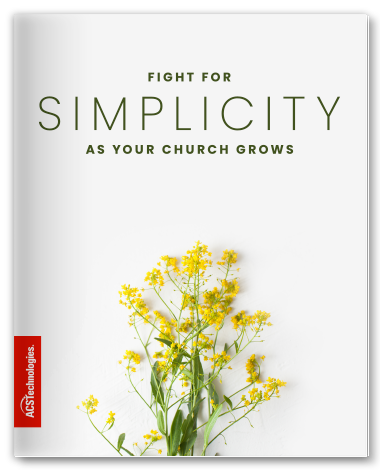Though churches should be administered in a business-like manner, they shouldn’t actually run like a business. A business is full of paid employees with paid tasks at hand who take vacations and may not think about the business once they’re off the clock. A church should be full of people who collectively choose to worship, fellowship, disciple and be discipled, be active in ministry, and on a mission to share the Good News. Similar to corporations, churches are growth-oriented, but where they differ is that churches must avoid adopting the corporate growth lifestyle of hard-nose competition, glossy marketing, and an “end-justifies-the-means” mentality.
Local churches aren’t competitors – they all serve the same CEO. Can I get an amen? Despite our desire to turn church growth into a science, it actually defies formulas; it’s too complex, too subtle, too paradoxical. And that’s exactly the way God wants it so we have to depend according to Ephesians 3:19 on Him for the welfare of our local church.
Most leaders have walked down this path in the past, and probably more than once, to depend on God while putting physical steps into action where a book or conference session inspires them; but without a roadmap, they take the wrong paths.
Instead of simplicity, they’re left with uncertainty because frankly, church growth can be complicated and even paradoxical. Ministry expert, Fight for Simplicity as Your Church Grows points out these three common mistakes that church leaders make out of habit, ease or even comfortability and some thoughts to ponder:
(1) Keep Doing Things the Way They’ve Been Done
Timeless principles are important. But practices should change, especially as your church grows. Most churches don’t want to keep doing things the same way. The pace of ministry combined with the challenges of growth can put change on the backburner.
(2) Fail to Look at the Calendar Holistically
Consider how much time and money the current schedule requires of families. It’s easy to forget what’s being asked of families and members. They aren’t expecting to come to everything. Church isn’t connected to their job, so they see things differently.
(3) Ignore Things of High Return
Focusing efforts leads to greater impact. There are limited resources. Time, money, attention, people, you name it. Try to keep everything and resources from getting spread thin. Think about implementing a budget friendly church growth strategy.
As mentioned in a previous blog in this series, Fight for Simplicity as Your Church Grows: The Symptoms of Complexity, companies know the larger they get, the simpler they must be. Complexity is easy. Simplicity requires discipline, focus, and a willingness to cut out things outside the mission. This is how you set the stage for future growth. The wrong church growth tools are: pressure, competition and guilt. The right church growth tools are: prayer, sanctification, discipleship, outreach, sacrifice, discomfort, compassion, diversity — in other words: biblical application.
Church growth has been said to be about effective evangelism and not about membership increase. Don’t envy the church sizes around you, focus on your church’s growth mission statement. And if you don’t have one, meet with your church elders and create one before you do anything else — this will help you prioritize the next steps, reinforce the mission at hand for your church body, and keep you unified. Remember, when you are choosing to simplify you are saying yes and no almost equally to remain on target and keep the main thing the main thing.
I don’t have to remind you that the holidays are just around the corner, which adds a lot of “must do’s” and “to do’s” to all of our schedules — scheduling volunteers for church events, setting up live streaming tasks, and even thinking of new ways to encourage first time visitors and givers. Decide now, to simplify with the intent to stay connected with church members.
A couple weeks ago, our Pastor announced what I think is the greatest idea for the Live Nativity the church will host this year. He said something along the lines of, “Instead of adding two practices a week from Thanksgiving on, we are going to try something new this year. Sign up if your family would like to participate, and we’ll gather together on x date for the Live Nativity and assign roles with minimal costumes on the spot and then we’ll begin. It’ll be the truest sense of ‘live’ and I’ll even hold up the star from a fishing pole.”
I think there was a resounding sigh of relief from all the parents and an expectation for a fun evening to gather together and share the birth of our Savior in a fresh way with the community. Simplified. Keeping the main thing, the main thing. All in favor, say aye.
Simplicity is a never ending responsibility, especially for growing churches. It must stay as a top priority, though. When it does, your church is ready to reach more people. Our newest resource, Fight for Simplicity as Your Church Grows, eliminates this frustration for you, your staff, and your church along with the other guides in the Roadmaps Series: Solutions to Large Church Problems. And, to make it even easier and so you don’t miss any of our Church Growth Resources, you can also receive our ministry church blogs straight to your inbox!
Donna is ACS Technologies’ Chief Customer Officer. Her focus is on strategic planning and operations of the customer experience organization. This includes Implementation, Ministry Success, Learning, Training, and Customer Service. Donna’s focus and passion has always been for our ministry partners as she has worked in the service part of the organization her entire career. Donna graduated from Lander College with a BS Degree in Computer Science and joined the company in 1985 as a Customer Support Representative.





